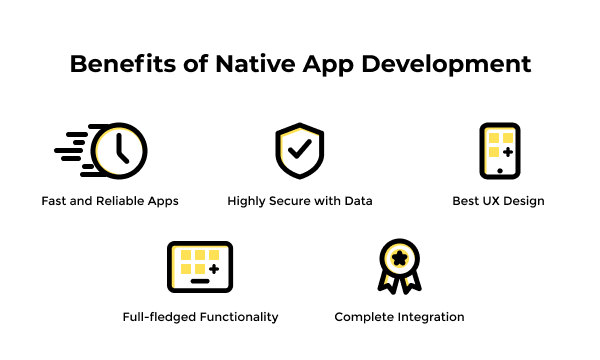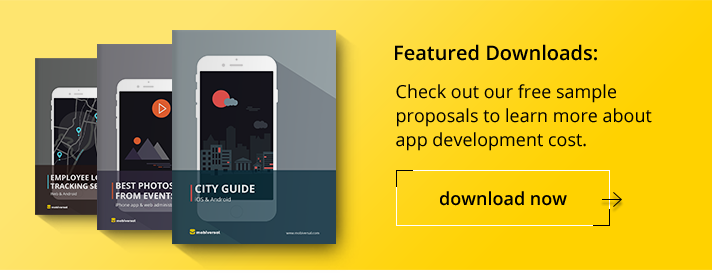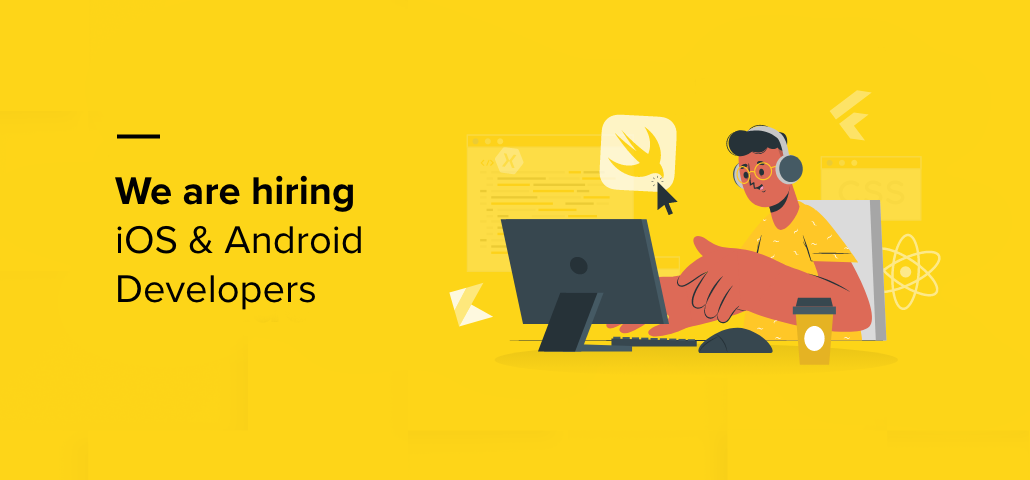How to grow your business with a native mobile app
It’s a well-known fact that the average person consumes twice as much content on their mobile phones than on their desktop. Moreover, chances are that you are reading this article right now on your phone. The number of software applications has been soaring in the last few years, so much that at the end of 2021, there were almost 3 million available through the Google play store and App Store.
The importance of developing a mobile app is undeniable, as it facilitates direct communication and improves customer engagement, increases brand awareness, provides effective marketing channels, and creates the convenience of access to the customers. The lines between various options have become increasingly blurred, and it can be difficult for companies to choose an approach that best suits their needs.
App development can be done in many ways. The default way to develop a mobile app is to write native code for each device for your app development, usually Kotlin for Android and Swift for iOS. The native app has a single codebase dedicated per platform.
Another way to create a mobile app is to create ‘hybrid’ applications that were essentially web pages presented within an application container called a web view. Hybrid apps blend web elements with mobile ones. So, you create a codebase using standard web technologies (HTML, CSS, JavaScript). Hybrid apps mean that the app development has a single codebase that can be run on any of the platforms whether it’s iOS or Android
Cross-platform is another way of building apps. Cross-platform app development might resemble hybrid development, but they are not the same. But the only similarity between them is “code shareability”. The cross-platform app approach allows developers to reusable code for building apps for different OS.
This article will look deeper into Native Mobile App Development and the benefits of choosing this particular development approach.
What is Native Mobile App Development?
Native mobile app development is the process of building apps using programming languages that are tailored to that mobile platform. You can download them from dedicated stores like Apple’s App Store or Google Play.
In other words, if you’re building an application to release on an iPhone or other Apple device, using the official development language for that platform, you’ll be building an iOS native app.
For mobile apps for iOS, app developers will use the Objective-C or Swift programming languages, while developing for Android requires programming languages like Java or Kotlin. It is important to know that both Apple and Google provide app developers with their own development tools, interface elements, and SDKs.
Native App Development vs. Hybrid vs. Cross-platform
There are three types of mobile applications: cross-platform, native, and hybrid. On the surface, they appear to have similar features and designs, but their underlying technology is worlds apart. As the name implies, hybrid applications contain elements of both web apps and native mobile apps. They’re created using HTML, CSS, and JavaScript on the web. Customers may download them to their Android or iOS devices through app stores if they choose.
Native app development
As we mentioned before, native apps run on specific technology dedicated to either Android or iOS. The programming languages used to develop Native apps for Android and iOS are different. Kotlin or Java would be employed when making an app with an Android system on a smartphone. At the same time, Swift could just as easily come into play if you want something designed specifically for iPhone users who love Apple’s products so much they’ll never switch!
Features
- Have The Best Performance
- Are more secure
- More Interactive And Intuitive
- High usability of API
- Easier to avoid bugs
- Works offline
When to use it?
- When you only need one platform to publish your mobile app
- When your app is dependable on the use of a camera, GPS, and other hardware-based features
- You want to provide your audience with the most incredible experience possible
Hybrid mobile development
Hybrid mobile app development is a mix between native applications and web-based ones. Hybrid apps use programming languages such as JavaScript, HTML5/CSS3 to develop the backend parts, which can be uploaded onto Google Play or Apple App Store for distribution across multiple platforms.
Features
- Less expensive than building native apps
- The app can be published quicker because it has a single code base that can be run on any platform, whether it’s IOS or Android
When to use it?
- You target a larger audience that will use your app on various platforms, both mobile and web
- User’s interaction with the app will be without using complex animations or other complex features
- You’re short of time, and you want to develop an app that will run on multiple platforms
- You’re testing your product as an MVP
Cross-platform mobile development
Though many people mistake that hybrid and cross-platform are the same. But the only similarity between both types of the app is the “code shareability.” The cross-platform app approach allows developers to write code once and reuse it for different platforms.
Features
- Low-cost custom app with secure, stable, and easy to maintain and iterate features
- Easy implementation of new features
- App’s user experience and UI performance match with native apps as it shares a similar codebase
When to use it?
- If you have a low budget and want to launch your app to target both audiences, Android and iOS users
- Your product is not complex and doesn’t require extensive coding in creating complex features
Advantages of Native Mobile App Development
- Fast and reliable
When developed using native mobile app development, the software is built and optimized for a specific platform, iOS or Android. As a result, the app has significant performance. Native apps are quick and responsive since they’re created for a particular platform and compiled with their fundamental programming language and APIs. Because of this, the app is much more efficient and faster as compared to the hybrid app. The app is saved on the device, allowing the software to use the device’s processing powerfully.

- Native apps are highly secure
Web applications rely on various browsers and technologies such as Javascript, HTML5, and CSS, which means that web apps will have more performance gaps. Native applications, on the other hand, provide greater security and improved performance upgrades.
Native mobile applications also allow businesses to take advantage of mobile device management technologies, and can directly access the hardware of the device such as the GPS, camera, microphone, etc.
Native apps are a great approach to ensure that users have reliable data protection.
- Native apps have better UI/UX
It’s a well-known fact that native applications run smoothly. Native applications have the same user interface as their devices, giving them the appearance of being an integral element of the device. One of the most significant advantages of native apps is the superior user experience, given the fact that developers can use elements that are specific to each platform.
The guidelines created for platforms like iOS or Android are specifically designed to enhance the user experience, and it is possible to implement these easily to develop clean, smooth, and easy-to-use User Interfaces (UI). Because of platform-specific UI standards, the app’s flow becomes more balanced. This aids users in learning the application fast and executing multiple tasks easily.
- Easy debugging – Fewer bugs during development
Native mobile apps have fewer bugs to worry about because you don’t depend on a cross-platform technology such as Xamarin or Cordova. Native app developers have access to more advanced and new application development technologies. Native applications have generally shorter development cycles per platform, allowing users to enjoy enhanced features sooner.
Bugs are a significant issue in hybrid app development since there’s an extra layer that you can’t manage, which raises the likelihood of faults. Native app development has fewer risks of bugs when compared to hybrid app development.
- Work offline
The most excellent thing about native applications is that they can operate independently, even if you don’t have access to the internet. So, don’t be concerned if you don’t have network coverage or have problems with your connection. A native mobile app will function for you. Now use your native application whenever and wherever you want without worrying about slow internet or broken links.
Disadvantages of Choosing a Native Mobile App
- Costly and time-consuming
The disadvantage of building a native application is that you can’t use the code on another mobile platform. Native applications also need dedicated maintenance.
You need to consider that when choosing native mobile app development, you have to build and launch for both iOS and Android. It implies higher cost, having two teams working on different platforms. Also, platform-dependent development is time-consuming; reusing the same work for another platform would be difficult. Instead, a separate section would be required to develop the alternative version.
- Updates
For a variety of reasons, native apps frequently receive new versions. The most prevalent reason is to fix bugs and malfunctions. Consequently, app store upgrades are required if the user isn’t aware of these updates or ignores them to save storage space.
Ready to build a native mobile application and growth your business?
If you have the option of choosing a native app, we highly recommend you to go with the native app as it will be helpful for you in many possible ways. The benefits of native mobile app development for a business are huge, from loyal customers to higher revenue, but so too can be its challenges.
Launching a digital product is more than building an app. Next to your own app specification, you need to make sure that you follow the guidelines of the app store, regardless of whether that’s Apple’s App Store or Google Play for Android apps. This means you’ll need a dedicated team of experts to ensure that everything goes to plan, giving your app the biggest chance of succeeding.
The lack of a team can make the process long and costly, and you might end up with an app that doesn’t work or sell to customers. Our Mobiversal team of product people is here to help and guide you through the process, offering consultancy, product strategy, mobile app UI/UX, native apps development, and more.
If you want to get your app made in the best possible way, you can contact us today, and we will get back to you as soon as we can.



